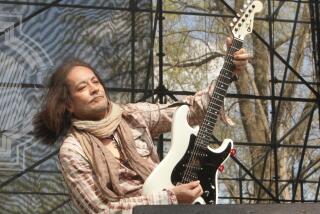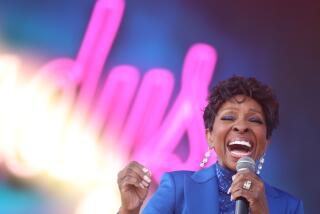ORANGE COUNTY : Arthur Lee Finds Love Once Again
- Share via
Arthur Lee’s wardrobe may have seemed strange in the 1960s when he and his group, Love, helped set flamboyant fashion trends as one of the first prominent bands on the Los Angeles rock scene.
But when Lee turned up for a recent interview wearing a black-and-white pullover bearing the emblem of the confrontational rap group Public Enemy, the fashion statement seemed stranger still.
Public Enemy, after all, is a raw, angry band that brandishes toy Uzis during its shows and preaches a militant, polarizing line raging against the social suppression of black youth. Lee, on the other hand, spent the ‘60s as one of rock’s most unflagging--and most creative--banner wavers for the hippie ideals of peace, love and togetherness.
As it turns out, though, the Public Enemy sweater wasn’t a philosophical statement--Lee isn’t a fan of the band, or of rap in general. It was merely an attempt to keep warm as he nursed a cold and a bottle of wine cooler in the West Hollywood office of a company that has booked him in a “Psychedelic Summer of Love” tour that is crisscrossing the Southland this week.
Lee, who has been out of sight since a 1981 album, will play tonight at the Coach House with a three-man band that doesn’t include any other original members of his oft-shifting Love lineup. The revue, which includes the Seeds and Big Brother & the Holding Company, also plays Wednesday at the Bacchanal in San Diego and Friday at the Universal Amphitheatre.
Tall and wiry, with a wild, tangled crown of black hair and a few touches of gray creeping into his long sideburns, Lee reminisced in a low, scratchy voice, his words those of an unreconstructed veteran of the original Summer of Love:
“I was looking to bring people together,” he said. “The name (of the group) was Love, not Hate--and it sure brought me a lot of (love) in my life.”
Love’s best music was far more than hippie helium. Along with his many optimistic numbers and odes to the beauty of love, Lee was capable of bringing deep sadness, existential dread or a sharp, ironic edge to his songs. There was certainly an edge to his recollections, along with a healthy measure of ego, as Lee posed himself as an original who was copied by others who went on to exceed him in fame and success.
Lee spoke of how his band had been called the Grass Roots--”until this fool came in and took my name and gave it to these other suckers. Instead of fighting City Hall, I named the group Love.”
Then there was Jim Morrison, an avowed admirer of Love, which was one of the top acts on the Los Angeles scene at a time when the Doors were still little-known.
“Pamela Morrison, that was my dame (before she married the Doors singer),” Lee said. “Everything I did, this fool did. I got a black Labrador, he got a black Labrador. He always wanted to hang out with me. I liked Jim Morrison, but I didn’t like him hanging around my house all the time. He liked me as a musician, and I think he wanted to be a friend. I couldn’t figure him out. I didn’t know what he was doing.”
Jimi Hendrix is another rock icon whom Lee claims to have influenced. In fact, according to Hendrix’s biographer, David Henderson, Lee was the producer and songwriter for the first known recording session that Hendrix played on: a 1963 single called “My Diary” by singer Rosa Lee Brooks.
In those days, Lee said, he worked the Los Angeles R&B; circuit and kept trying unsuccessfully to land a recording deal with labels specializing in black music. By 1965, when Love was formed, Lee was on a path to becoming one of the first blacks to make a name playing rock music that won a primarily white audience.
“Jimi Hendrix and I had been friends before my rock thing came about,” Lee said. “Then I (became) this psychedelic whatchamacallit. I think somebody blew in his ear to dress like me. I’ll always think that’s what happened. Next thing I knew, they were telling me about ‘this great black guitar player that looks like you.’ ”
In 1970, Hendrix teamed up with Love for recording sessions in England. Only one song, “The Everlasting First,” was ever released.
It was a rarity for Love to appear outside Los Angeles, especially the early lineup of the band that is responsible for its best-known work, including Love’s lone Top 40 hit, “7 and 7 Is.”
Lee said Love didn’t tour because “I didn’t feel like it. The people I was with, their behavior patterns didn’t coincide with my existence as far as being on stage.” Lee wouldn’t elaborate on his problems with other band members (he said he remains in touch with only one member of the early Love, drummer Snoopy Pfisterer), nor was he inclined to discuss the details of how Love’s music evolved.
Love at its peak embodied what was best about ‘60s rock: an adventurous, exploring spirit that led to music that was varied and distinctive. Lee, an excellent melodist, was capable of singing lyrical ballads in a delicate but clear tenor or of shouting huskily over careening psychedelia. Besides folk-rock, blues and hard rock, Love skillfully wove jazz, classical, country and even vaudeville influences into its sound. The band’s peak achievement, “Forever Changes,” is a haunting, shimmering, one-of-a-kind album that is widely acclaimed as one of rock’s masterpieces.
“I appreciate the way people feel about it,” Lee said matter-of-factly. “I thought I would express my thoughts and feelings about this life, and this life is definitely forever changes.”
In the album notes to a Rhino Records “Best of Love” compilation, the band’s producer, Bruce Botnick, described Lee as “real unusual--on acid 24 hours a day. In fact, everybody in the band was out of it.”
Said Lee: “Bruce Botnick should have been born with a foot in his mouth. I never had nothing to do with no drugs in my life. I take Bayer aspirin.” Lee was adamant that there should be no discussion of drugs in a story about Love: “What’s that got to do with music?”
In fact, Lee wrote and sang one of rock’s most memorable anti-drug songs, “Signed D.C.,” in which he acted out the role of a junkie in the throes of self-pity and self-revulsion. It’s a song that Guns N’ Roses, the hot, young L.A. hard-rock band, would be well-advised to record, both as a nod to the Los Angeles rock past and as partial expiation for its own exploitation of a hard-drinking, hard-drugging image.
Lee recorded fairly steadily from 1966 through 1974, releasing albums with a shifting Love lineup (the group that made the first, most significant recordings broke up in 1968), or as a solo artist. Since then, his output has been sporadic. Lee said his band for the upcoming shows includes bassist Sherwood Akuna and drummer Joe Blocker, who first appeared with Lee on a 1974 Love album, and Berton Averre, former lead guitarist of the Knack.
Lee, who has remained a Los Angeles resident, was vague about what he has been doing since his last album in 1981.
“I’ve been taking care of my mother--she’ll be 86 years old in February--and taking care of my life,” he said. “I like to go to the store, walk my dog in the morning, maybe meet a nice, frisky chick. I’ve been writing songs, but I’m in no hell of a hurry to come out with something that I’m not sure is going to benefit my own self.
“They’ve re-released my first three albums on compact disc,” Lee said. “What I need to do is get out and play and have all my friends come see me. These people (who booked Lee for the ‘Psychedelic Summer of Love’ tour) are good enough to remember the ‘60s, and they want to make some money. I’m good enough to have lived in the ‘60s and written some songs.”
The Seeds, Love with Arthur Lee, and Big Brother & the Holding Company play at 8 p.m. today at the Coach House, 33157 Camino Capistrano, San Juan Capistrano. Tickets: $19.50. Information: (714) 496-8930.
More to Read
The biggest entertainment stories
Get our big stories about Hollywood, film, television, music, arts, culture and more right in your inbox as soon as they publish.
You may occasionally receive promotional content from the Los Angeles Times.











